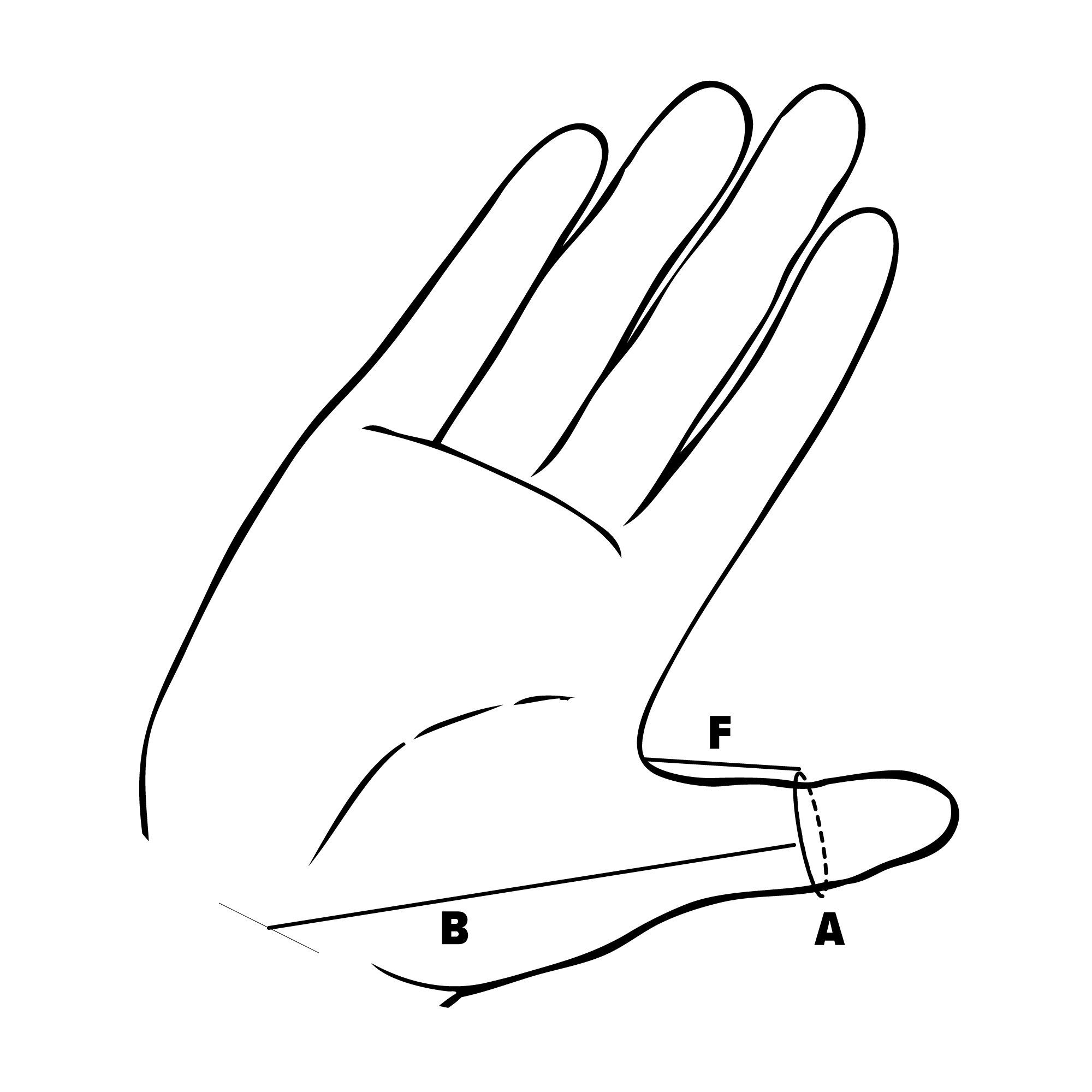Vous avez pas d'articles dans votre panier.
0 article(s) dans votre panier
Vous avez pas d'articles dans votre panier.
For personal home use only.
The McKie Thumb Splint with the addition of a moldable aquaplast stay over the web space between the thumb and pointer finger. The stay can be molded to the exact needs of the individual. This splint is recommended for moderate to severe spasticity when the thumb splint alone does not hold the thumb in opposition.
Molding the plastic Web-Stay

Use A and B measurements to determine which size splint you should order.
Measure to the 1/10th of a centimeter the circumference of the far or distal thumb joint.
Measure to the 1/10th of a centimeter the distance on the palm from the distal thumb joint to the center of the wrist crease.
Measure from the distal thumb crease to the bottom of the web space.
On the appropriate chart (see links below), find the the square where Measurement A and Measurement B meet. The square should fall within a bold area corresponding to the correct size. If Neonatal use only Measurement A an Neonatal Sizing and refer to the neonatal chart for neonatal sizing.
Note splint size and left or right hand, as this is required when ordering. If ordering offline, the catalog number for the above example would be P5-L (left hand) or P5-R (right hand).
To assure the best fit, use of a sizing kit is recommended. If a sizing kit is unavailable, follow the directions above. Neonatal sizes are suitable for very small or prematurely born infants. Pediatric sizes are suitable for children from about 3 months to 6-10 years. Older children and adults need adult sizes. When figuring sizes, it is important to use a centimeter tape measure.
When hand sizes fall outside the standard sizes provided, you may call or choose the custom options when ordering. To order a custom size we will need measurements A, B & F. Select or specify whether you need a longer strap, larger thumb piece or added reinforcement at the web space. Custom cut longer, larger supinator straps are also available.

Step 1: Put the thumb through the thumb hole. Orient the splint so that the stitching follows the crest of the web between thumb and index finger. Snug to fit comfortably. Draw the strap of the splint at an angle so that it drops below the corner of the palm. (For medical personnel, it sits below the pisiform bone). Pull the split strap so it continues around the back of the hand all the way around again to the palm side.
Step 2: Depending on your intent, you can attach the hook tape in either of 2 ways:
Option A: If you are experiencing thumb pain or arthritis at the base of the thumb (C-M-C joint), direct the pull of the strap up into the base of the thumb metacarpal as illustrated.
Option B: If you are attempting to improve grasp quality, attach the hook tape to put mild pressure on the head of the thumb metacarpal.

Step 1: To attach supinator strap, undo strap from thumb splint. Reattach thumb splint over supinator strap. (figure 3)
Step 2: Wind one turn around forearm, then one turn behind elbow. Attach wider, squared hook tape end of strap to itself above elbow (figure 4). The splint is designed to assist forearm extension, so supinator strap must cut across the back of elbow.
Step 3: Once splint is in place, passively turn forearm palm up (supination) and slightly extend wrist (figure 5). Make any necessary adjustments to supinator strap to ensure a snug fit. The attachment above the elbow, while snug, should be comfortable, balancing good coloration of the hand with some pull from the strap.
Step 4: Finally, check the hand splint and, if necessary, rotate it to ensure the thumb is positioned to oppose fingers.
Always follow precautions on label regarding splint application and wear.
Both the strap of the Thumb Splint and the Adjustable Supinator Strap may be shortened to accommodate different size hands or to compensate for some loss of elasticity in the straps that occurs over time.

If after trying the on the splint, the splint strap and velcro protrude beyond the thumb, cut strap and/or hook tape to fit the hand.

The squared end of the supinator strap may be cut to fit a shorter or narrower forearm. Attach free piece of hook tape to the squared end of strap.
All McKie Thumb Splints and Supinator Straps are made of washable, 1.5 mm fabric-covered neoprene. Outer fabric is looped Nylon which allows attachment of hook tape anywhere on the splints . All splints are available in 6 colors, black, navy blue, red, royal blue, pink and tan. “Decorated” splints are available in sizes P4, P5 and P6.
Supination is the forearm motion that turns the palm up. Whether child or adult, it is needed for most activities of daily living including eating, cup holding, dressing, bathing, combing hair, brushing teeth and holding a pencil. Control of supination develops very early when infants begin to explore all sides of objects. It can be lost or fail to develop as a result of neurological injury.